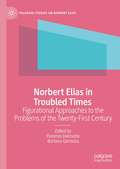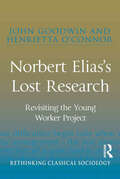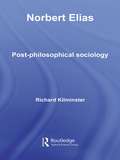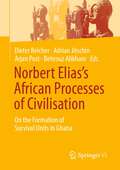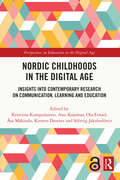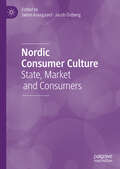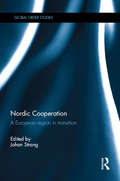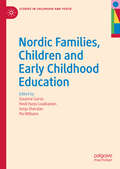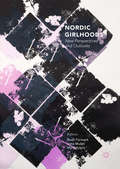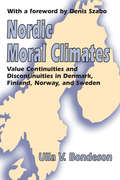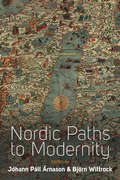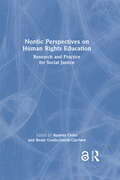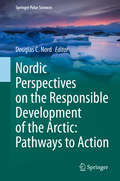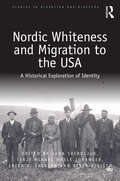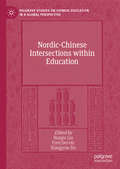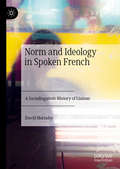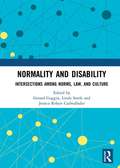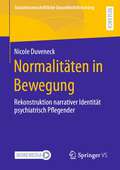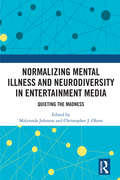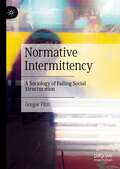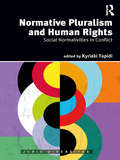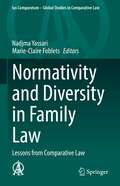- Table View
- List View
Norbert Elias in Troubled Times: Figurational Approaches to the Problems of the Twenty-First Century (Palgrave Studies on Norbert Elias)
by Barbara Górnicka Florence DelmotteThis edited collection brings together texts that discuss current major issues in our troubled times through the lens of Norbert Elias’s sociology. It sheds light on both the contemporary world and some of Elias’s most controversial concepts. Through examination of the ‘current affairs’, political and social contemporary changes, the authors in this collection present new and challenging ways of understanding these social processes and figurations. Ultimately, the objective of the book is to embrace and utilise some of the more polemical aspects of Elias’s legacy, such as the exploration of decivilizing processes, decivilizing spurts, and dys-civilization. It investigates to what extent Elias’s sociological analyses are still applicable in our studies of the developments that mark our troubled times. It does so through both global and local lenses, theoretically and empirically, and above all, by connecting past, present, and possible futures of all human societies.
Norbert Elias und der Tod: Eine empirische Überprüfung
by Matthias MeitzlerDer Einfluss von Norbert Elias als soziologischer Klassiker ist unbestritten. Dieser Status verdankt sich in erster Linie seiner Theorie vom Zivilisationsprozess. In dessen Geist steht auch Elias‘ 1982 erschienenes und in mehrere Sprachen übersetztes Buch Über die Einsamkeit der Sterbenden in unseren Tagen. Dort widmet er sich der Frage, wie Menschen der Endlichkeit des Lebens gegenüberstehen, unter welchen Bedingungen sie sterben, sich voneinander verabschieden, umeinander trauern und sich aneinander erinnern. Im Zentrum steht die Einsicht, dass es immerzu die Lebenden sind, die das Sterblichkeitsproblem zu bewältigen haben. Menschen in zivilisierten Gesellschaften tun dies Elias zufolge, indem sie Sterben und Tod verdrängen. Als schambesetztes Thema werde das Lebensende in alltäglichen Gesprächssituationen zumeist ausgeblendet; ferner haben sich Sterbeprozesse im Zuge sozialer Ausdifferenzierung vom heimischen Familienumfeld in Institutionen wie das Krankenhaus verlagert. Diese Entwicklung führe dazu, dass heute anders gestorben werde als früher: steril, geräuschlos, unauffällig – und vor allem einsam. Für die thanatosoziologische Erforschung des Umgangs mit Sterben, Tod und Trauer erwies sich Elias‘ Studie als Meilenstein. Kein anderes deutschsprachiges Buch dürfte in diesem Zusammenhang häufiger zitiert worden sein. Was jedoch fehlt, ist eine systematische Überprüfung der empirischen Aktualität seiner Thesen. Dieses Desiderat bildet den Ansatzpunkt für die vorliegende Untersuchung. Ausgehend von originären qualitativen Forschungen werden zentrale Aspekte der Elias’schen Perspektive aufgegriffen und auf ihre Anschlussfähigkeit hin analysiert. Ein Schwerpunkt liegt auf der Frage, was der soziale Wandel der vergangenen Jahrzehnte für die heutige Situation der Sterbenden bedeutet.
Norbert Elias's Lost Research: Revisiting the Young Worker Project (Rethinking Classical Sociology Ser.)
by John Goodwin Henrietta O'ConnorBased on the re-discovery of a lost sociological project led by Norbert Elias at the University of Leicester, this book re-visits the project: The Adjustment of Young Workers to Work Situations and Adult Roles. Norbert Elias's Lost Research makes use of the interview booklets documenting the lives of nearly 900 Leicester school leavers at the time, to give a unique account of Elias's only foray into large-scale, publicly funded research. Covering all aspects of the research from the development of the research proposal, the selection and management of the research team, the fieldwork, Elias's theoretical work to the ultimate demise of the research project, this book makes a significant contribution to our understanding of existing Eliasian texts by introducing this project to a wider audience and investigating and applying Elias's theoretical work to the areas of youth and school to work transitions. Shedding new light on Elias's thought, whilst exploring questions of methodology and the relevance of older research to modern questions, this book will be of interest to social theorists, as well as sociologists with interests in research methodology and the history of sociology.
Norbert Elias: Post-philosophical Sociology
by Richard KilminsterFew sociologists of the first rank have scandalised the academic world to the extent that Elias did. Developed out of the German sociology of knowledge in the 1920s, Elias’s sociology contains a sweeping radicalism which declares an academic ‘war on all your houses’. His sociology of the ‘human condition’ sweeps aside the contemporary focus on ‘modernity’ and rejects most of the paradigms of sociology as one-sided, economistic, teleological, individualistic and/or rationalistic. As sociologists, Elias also asks us to distance ourselves from mainstream psychology, history and above all, philosophy, which is summarily abandoned, although carried forward on a higher level. This enlightening book written by a close friend and pupil of Elias, is the first book to explain the refractory, uncomfortable, side of Elias’s sociological radicalism and to brace us for its implications. It is also the first in-depth analysis of Elias’s last work The Symbol Theory in the light of selected contemporary developments in archaeology, anthropology and evolutionary theory.
Norbert Elias’s African Processes of Civilisation: On the Formation of Survival Units in Ghana
by Stephen Mennell Barbara MennellIn 1962 Norbert Elias was invited as a temporary professor at the University of Ghana in Legon, Accra. He taught, employed fieldwork, travelled, and met many people in postcolonial Africa. When Elias left Ghana in 1964, he had laid the basic groundwork for a fundamental sociological argument on human societies.The volume on hand is a selection of his unpublished writings based on these experiences. Together they touch upon not only the well-known criticism of Eurocentrism and a developmental perspective but also what could be considered the core of Elias’s work: the concept of civilisation. In a foreword, Dieter Reicher and Adrian Jitschin have endeavoured to explain and break down the relations of Elias’s African experience to the rest of his work and biography. They also clarified some misleading interpretations of Elias’s time in Africa. Finally, Arjan Post has uncovered the previously unknown fascinating story of Elias’ encounter with Malcolm X in an epilogue.
Nordic Childhoods in the Digital Age: Insights into Contemporary Research on Communication, Learning and Education (Perspectives on Education in the Digital Age)
by Ola Erstad Kirsten Drotner Åsa Mäkitalo Kristiina Kumpulainen Anu Kajamaa Sólveig JakobsdóttirThis book adds to the international research literature on contemporary Nordic childhoods in the context of fast evolving technologies. Bringing together researchers from Finland, Norway, Sweden, Denmark and Iceland, it addresses pressing issues around children’s communication, learning and education in the digital age. The volume sheds light on cultural values, educational policies and conceptions of children and childhood, and child-media relationships inherent in Nordic societies. Chapters investigate both formal education and everyday informal spaces as research sites. The book argues for the importance of understanding local cultures, values and communication practices that make up contemporary digital childhoods and extends current discourses on children’s screen time to bring in new insights about the nature of children’s digital engagement. This book will appeal to researchers, scholars, post graduate students and policy makers in the fields of childhood education, educational technology and communication. It will also be of interest to those studying and teaching in communication studies, learning and educational sciences at a higher level.
Nordic Consumer Culture: State, Market and Consumers
by Søren Askegaard Jacob ÖstbergUnpacking the complexities of Nordic consumer culture, this edited collection responds to the growing interest in regionalism within consumer research and marketing. By taking a closer look at the interaction between the state and the market in Nordic countries, the authors examine how consumer behaviour is impacted by the region’s unique context. Important elements of Nordic culture are explored, such as its underlying element of mythology and the concept of ‘hygge,’ an object of global consumption. Those studying consumer behaviour, branding, and marketing more generally, will find this book a fascinating contribution to research.
Nordic Cooperation: A European region in transition (Global Order Studies)
by Johan StrangThe recent crises in global economy and in European integration have caused a considerable revival of interest in the Nordic Welfare Model. However, less attention has been given to the ways in which the nations that form Scandinavia or ‘Norden’ are connected through various forms of inter- and transnational cooperation. With contributions from a team of experts in the field, this volume analyses Nordic cooperation in a European perspective and argues that this special form of transnational cooperation has been crucial in the development of the Nordic Welfare Model. In addition, it also contends that the Nordic model of transnational cooperation is a relevant case study when pondering the present problems of European integration. This text will be of key interest to students, researchers and policy makers studying the Nordic Model and transnational cooperation and more generally to those interested in European studies, Scandinavian studies, welfare studies, international relations and regional integration.
Nordic Families, Children and Early Childhood Education (Studies in Childhood and Youth)
by Susanne Garvis Sonja Sheridan Heidi Harju-Luukkainen Pia WilliamsLargely as a result of social policies and cultural factors, the Nordic countries continually score high in lifestyle measures, quality of life and children’s outcomes. This book brings together authors from the Nordic countries (Denmark, Finland, Iceland, Norway and Sweden) to share knowledge and understanding regarding families, children, primary education and children’s leisure time activities. The empirical research and theoretical contributions provide important insights into the ‘Nordic model’ and explore the issues facing Nordic countries. The book reveals that while there are many similarities across the countries, differences also arise. The content of the book is more relevant now than ever, as countries look at better ways to support their populations. Nordic Families, Children and Early Childhood Education will be of interest to students and scholars across a range of disciplines, including Education, Sociology and Social Policy.
Nordic Girlhoods
by Bodil Formark Heta Mulari Myry VoipioThis edited collection is an interdisciplinary and dialogical endeavor focused on the field of Nordic Girlhood Studies. It investigates young femininity as well as the key themes and concepts of Girlhood Studies, including girl power, feminisms, femininity, gender equality, postfeminism and sexualities in the specific cultural, historical and political context of the Nordic region. The chapters of the book consist of thematic case studies, including memories of girl power in the Finnish context, gendered harassment experienced and explained by Finnish girls, troublesome girlhood within the Swedish context and girls' subjectification projects in Nordic welfare state. Further, the case studies are accompanied by dialogical Outlook-essays, where researchers either outside Nordic region or from adjacent research fields reflect on Nordic Girlhood Studies through comparisons and reflections form their vantage point. The book will be of scholarly interest to researchers and students working especially on the fields of Girlhood Studies, Youth Studies, Gender Studies, Sociology and Cultural Studies both within the Nordic region and outside.
Nordic Moral Climates: Value Continuities and Discontinuities in Denmark, Finland, Norway, and Sweden
by Ulla V. BondesonMorality was a dominant theme in the 1990s, but concerns about morality seem omnipresent in the first years of the third millennium. The year 2002 witnessed the greatest corporate scandals ever seen in the United States, with immense impact financially and in human terms. Sex scandals were pervasive among Catholic priests in the United States, disrupting the lives of thousands of abused children. In Scandinavia, moral debates and scandals are of a smaller magnitude, and more often related to questions about the handling of money by politicians.This volume takes an overarching look at the impact of such moral questions in the Nordic countries. Its approach is multi-disciplinarian, embracing philosophy, history, sociology, and political science. Based mainly upon a survey of representative samples in Denmark, Finland, Norway, and Sweden, this unique study combines interview questions on crime and justice with moral questions concerning equality, confidence, tolerance, and also personal, social, religious, political, and national values. Bondeson first discusses the Nordic countries from a historical perspective and in statistical terms. She then presents interview data on the general sense of justice in Nordic countries, in particular exploring how much social and legal equality the Scandinavians have achieved in their welfare states. She touches upon criminal behavior and victimization, and discusses crime prevention and punishment. Bondeson also reviews the problems and methods of the study. Finally, she adds depth to the statistical analysis by using a number of indexes of morality. A trend analysis illustrates the stability of these attitudes over time.Nordic Moral Climates is an original empirical study of moral values in Scandinavia. It is one of the few comprehensive studies on this subject conducted in any nation or group of nations. The book will be of great interest to criminologists, sociologists, and social theorists.
Nordic Paths To Modernity
by Bjorn Wittrock Johann Pall ArnasonWithin the growing attention to the diverse forms and trajectories of modern societies, the Nordic countries are now widely seen as a distinctive and instructive case. While discussions have centred on the 'Nordic model' of the welfare state and its record of adaptation to the changing global environment of the late twentieth century, this volume's focus goes beyond these themes. The guiding principle here is that a long-term historical-sociological perspective is needed to make sense of the Nordic paths to modernity; of their significant but not complete convergence in patterns, which for some time were perceived as aspects of a model to be emulated in other settings; and of the specific features that still set the five countries in question (Denmark, Sweden, Norway, Finland and Iceland) apart from one another. The contributors explore transformative processes, above all the change from an absolutistmilitary state to a democratic one with its welfarist phase, as well as the crucial experiences that will have significant implications on future developments.
Nordic Perspectives on Human Rights Education: Research and Practice for Social Justice
by Audrey OslerBacked by a range of case studies and recent developments in human rights education research, Nordic Perspectives on Human Rights Education guides readers through an analysis of educational inequities and identifies how internationally agreed-upon human rights standards may inform social justice practices within schools.In an age characterised by authoritarianism and extremism, but also social and climate justice movements, this book provides a critical analysis of current practice within schools. Contributing authors also discuss how a human rights framework may improve practice, supporting intersectional thinking and more sustainable learning environments, while also empowering teachers to confidently navigate issues of gender, national identity and minority rights.Divided into three distinct sections, chapters invite readers to consider: The context behind human rights education (HRE) Rights-based approaches to teaching and education International dialogue and how we may learn from the approaches of other countries. Drawing on research from the Nordic region, and discussing its implications elsewhere, this volume is an essential resource for scholars developing theory and practice in human rights education, social studies, citizenship education and international and comparative education.Chapter 2 of this book is freely available as a downloadable Open Access PDF at http://www.taylorfrancis.com under a Creative Commons Attribution (CC-BY) 4.0 license.Chapters 1, 6, 7, 9, 12 and 13 of this book are freely available as a downloadable Open Access PDF at http://www.taylorfrancis.com under a Creative Commons Attribution-Non Commercial-No Derivatives (CC-BY-NC-ND) 4.0 license.
Nordic Perspectives on the Responsible Development of the Arctic: Pathways to Action (Springer Polar Sciences)
by Douglas C. NordThis book investigates the multifaceted nature of change in today’s Nordic Arctic and the necessary research and policy development required to address the challenges and opportunities currently faced by this region. It focuses its attention on the recent efforts of the Nordic community to create specialized Centers of Excellence in Arctic Research in order to facilitate this process of scientific inquiry and policy articulation. The volume seeks to describe both the steps that lead to this decision and the manner in which this undertaking as evolved. The work highlights the research efforts of the four Centers and their investigations of a variety of issues including those related to ecosystem and wildlife management, the revitalization resource dependent communities, the emergence of new climate-born diseases and the development of adequate modeling techniques to assist northern communities in their efforts at adaptation and resilience building. Major discoveries and insights arising from these and other efforts are detailed and possible policy implications considered. The book also focuses attention on the challenges of creating and supporting multidisciplinary teams of researchers to investigate such concerns and the methods and means for facilitating their collaboration and the integration of their findings to form new and useful perspectives on the nature of change in the contemporary Arctic. It also provides helpful consideration and examples of how local and indigenous communities can be engaged in the co-production of knowledge regarding the region. The volume discusses how such research findings can be best communicated and shared between scientists, policymakers and northern residents. It considers the challenges of building common concern not just among different research disciplines but also between bureaucracies and the public. Only when this bridge-building effort is undertaken can true pathways to action be established.
Nordic Whiteness and Migration to the USA: A Historical Exploration of Identity (Studies in Migration and Diaspora)
by Jana Sverdljuk, Terje Mikael Hasle Joranger, Erika K. Jackson and Peter KivistoThis volume explores the complex and contradictory ways in which the cultural, scientific and political myth of whiteness has influenced identities, self-perceptions and the process of integration of Nordic immigrants into multicultural and racially segregated American society in the nineteenth and twentieth centuries. In deploying central insights from whiteness studies, postcolonial feminist and intersectionality theories, it shows that Nordic immigrants - Danes, Swedes, Finns, Norwegians and Sámi - contributed to and challenged American racism and white identity. A diverse group of immigrants, they could proclaim themselves ‘hyper-white’ and ‘better citizens than anybody else’, including Anglo-Saxons, thus taking for granted the racial bias of American citizenship and ownership rights, yet there were also various, unexpected intersections of whiteness with ethnicity, regional belonging, gender, sexuality, and political views. ‘Nordic whiteness’, then, was not a monolithic notion in the USA and could be challenged by other identities, which could even turn white Nordic immigrants into marginalised figures. A fascinating study of whiteness and identity among white migrants in the USA, Nordic Whiteness will appeal to scholars of sociology, history and anthropology with interests in Scandinavian studies, migration and diaspora studies and American studies.
Nordic-Chinese Intersections within Education (Palgrave Studies on Chinese Education in a Global Perspective)
by Fred Dervin Xiangyun Du Haiqin LiuThis book examines how the two educational systems of China and the Nordic countries intersect. Over the past decade, there has been increased growth and interaction between China and the Nordic countries due to both government encouragement and academic curiosity. This book rejects a simplistic approach that presents both spaces as culturally uniform, confronting ‘East’ and ‘West’ entities, and suggests a comparative and contrastive approach that is critical and reflexive in both theory and methodology. This does not solely concentrate on difference, but emphasises similarities, including studies on philosophical, conceptual and methodological issues. This nuanced edited collection will appeal to students and scholars of Nordic and Chinese education as well as globalisation and interculturality.
Norm and Ideology in Spoken French: A Sociolinguistic History of Liaison
by David HornsbyThis volume offers a diachronic sociolinguistic perspective on one of the most complex and fascinating variable speech phenomena in contemporary French. Liaison affects a number of word-final consonants which are realized before a vowel but not pre-pausally or before a consonant. Liaisons have traditionally been classified as obligatoire (obligatory), interdite (forbidden) and facultative (optional), the latter category subject to a highly complex prescriptive norm. This volume traces the evolution of this norm in prescriptive works published since the 16th Century, and sets it against actual practice as evidenced from linguists’ descriptions and recorded corpora. The author argues that optional (or variable) liaison in French offers a rich and well-documented example of language change driven by ideology in Kroch’s (1978) terms, in which an elite seeks to maintain a complex conservative norm in the face of generally simplifying changes led by lower socio-economic groups, who tend in this case to restrict liaison to a small set of traditionally obligatory environments.
Normalising Private Military Force: US Media Discourse and the Legitimization of Private Security Companies in Iraq (Routledge Private Security Studies)
by Christopher KearneyThis book examines the normalization of Private Military and Security Companies (PMSCs), and analyses US media discourse around the Nisour Square incident in Iraq as a pivotal case.States are increasingly relying on PMSCs to meet security needs. As a sign of ongoing normalization, these companies are now increasingly targeted by soft law or self-regulation. Rejecting the common claim that ‘mercenaries have always been with us’, this book sets out to analyse the underlying conditions that have allowed PMSCs to emerge in their uniquely contemporary incarnation. Divided into two parts, this book develops a novel poststructural framework of analy-sis to articulate social, political, and affective conditions that enabled PMSCs to prevail despite controversy. It draws on and operationalizes the Essex School’s logics-based approach, while developing it further with corpus linguistics, and ap-plies this framework to a large corpus of American mainstream media articles. The volume contributes to efforts aiming to overcome the alleged ‘methodological deficit’ of discourse analysis, while highlighting the importance of making uncon-sciously held truths visible.This book will be of interest to students of private security companies, military studies, critical security studies, and International Relations.
Normality and Disability: Intersections among Norms, Law, and Culture
by Gerard Goggin, Linda Steele and Jessica Robyn CadwalladerHotly contested, normality remains a powerful, complex category in contemporary law and culture. What is little realized are the ways in which disability underpins and shapes the operation of norms and the power dynamics of normalization. This pioneering collection explores the place of law in political, social, scientific and biomedical developments relating to disability and other categories of ‘abnormality’. The contributors show how law produces cultural meanings, norms, representations, artefacts and expressions of disability, abnormality and normality, as well as how law responds to and is constituted by cultures of disability. The collection traverses a range of contemporary legal and political issues including human rights, mercy killing, reproductive technologies, hate crime, policing, immigration and disability housing. It also explores the impact and ongoing legacies of historical practices such as eugenics and deinstitutionalization.Of interest to a wide range of scholars working on normality and law, the book also creates an opening for critical scholars and activists engaged with other marginalized and denigrated categories, notably contesting institutional violence in the context of settler colonialism, neoliberalism and imperialism, to engage more richly and politically with disability. This book was originally published as a special issue of the Continuum journal.
Normalitäten in Bewegung: Rekonstruktion narrativer Identität psychiatrisch Pflegender (Sozialwissenschaftliche Gesundheitsforschung)
by Nicole DuveneckAllgegenwärtig ist das Erzählen von Geschichten in der psychiatrischen Pflege. Zu pflegende Menschen, An- und Zugehörige wie auch professionell Pflegende erzählen fortwährend Geschichten – Geschichten über sich und ihr Leben zumal. Die vorliegende Studie nimmt die Selbst- bzw. Lebensgeschichten psychiatrisch Pflegender in den Blick und geht der Frage nach, wie die als psychiatrisch Pflegende bezeichneten Personen ihre narrative Identität konstruieren. Anhand autobiographisch-narrativer Interviews rekonstruiert Nicole Duveneck das zentrale sinnstiftende Strukturmuster der Identitätskonstruktion und entwickelt ein Modell, das die personale narrative Identität psychiatrisch Pflegender als einen die Normalität wandelnden und zugleich erhaltenden Prozess erfasst. Dieses Ergebnis verweist auf die ungebrochene Wirkmacht der Normalität im psychiatrischen Versorgungssystem und fordert – ob der mit der Normalität verbundenen exkludierenden Praktiken – zum kritischen Diskurs über und für eine gute psychiatrische Pflege auf.
Normalizing Mental Illness and Neurodiversity in Entertainment Media: Quieting the Madness
by Malynnda JohnsonThis volume examines the shift toward positive and more accurate portrayals of mental illness in entertainment media, asking where these succeed and considering where more needs to be done. With studies that identify and analyze the characters, viewpoints, and experiences of mental illness across film and television, it considers the messages conveyed about mental illness and reflects on how the different texts reflect, reinforce, or challenge sociocultural notions regarding mental illness. Presenting chapters that explore a range of texts from film and television, covering a variety of mental health conditions, including autism, post-traumatic stress disorder (PTSD), depression, and more, this book will appeal to scholars of sociology, cultural and media studies, and mental health.
Normative Intermittency: A Sociology of Failing Social Structuration
by Gregor FitziThis book addresses the manifold crisis of current societies and understands it as a failure of normative social structuration. As an exemplar for this development, it analyses the decline of welfare state models and the corresponding societal compromise. Yet, it evaluates them as a symptom of a wider malaise of normative orders in complex societies. The question thus arises as to how social science can study the ongoing societal transformation. The book frames the phenomenon as ‘normative intermittency’ to capture its fluid alternation of social structuration and destructuration and develops its analysis in three steps: first, it draws a theoretically reflected symptomatic of its occurrences; it then establishes the sociological diagnosis necessary to understand its unfolding and finally evaluates its political outcomes. Methodologically, the book advocates a complete overhaul of the analytical frames of sociology to gauge the intermittent rhythm of the ongoing societal transformation. Thus, it develops an innovative reading of classical sociological theory beyond a number of unreflected axiomatic assumptions of the current sociological mainstream. Thanks to the assessment of the political outcomes of failing social structuration the book turns to a discussion of the development of possible emancipation paths in the form of ‘transformative social action’; reflexively, this accounts for the results of the sociological diagnosis of the crisis of normative social orders. The main analyses within the book scrutinise a number of empirical phenomena that establish normative intermittency in current societies and refer to the major debates that are taking place on the related topics in the state of art of sociological and political theory.
Normative Pluralism and Human Rights: Social Normativities in Conflict (Juris Diversitas)
by Kyriaki TopidiThe complex legal situations arising from the coexistence of international law, state law, and social and religious norms in different parts of the world often include scenarios of conflict between them. These conflicting norms issued from different categories of ‘laws’ result in difficulties in describing, identifying and analysing human rights in plural environments. This volume studies how normative conflicts unfold when trapped in the aspirations of human rights and their local realizations. It reflects on how such tensions can be eased, while observing how and why they occur. The authors examine how obedience or resistance to the official law is generated through the interaction of a multiplicity of conflicting norms, interpretations and practices. Emphasis is placed on the actors involved in raising or decreasing the tension surrounding the conflict and the implications that the conflict carries, whether resolved or not, in conditions of asymmetric power movements. It is argued that legal responsiveness to state law depends on how people with different identities deal with it, narrate it and build expectations from it, bearing in mind that normative pluralism may also operate as an instrument towards the exclusion of certain communities from the public sphere. The chapters look particularly to expose the dialogue between parallel normative spheres in order for law to become more effective, while investigating the types of socio-legal variables that affect the functioning of law, leading to conflicts between rights, values and entire cultural frames.
Normativity and Diversity in Family Law: Lessons from Comparative Law (Ius Comparatum - Global Studies in Comparative Law #57)
by Nadjma Yassari Marie-Claire FobletsWith regard to family law, this volume examines claims based on cultural tradition, ethnic background, custom, religious affiliation and sexual orientation, as well as various other “claims” that are not officially recognized in state law, in 15 jurisdictions around the world. The country reports seek to determine whether these claims represent a challenge to family law as conceived by the state, and if so, how these challenges are being managed. The focus lies on the interaction between (i) claims and traditions raising minority-related and diversity-related issues and (ii) the state as the addressee of these demands for accommodation. The reports identify specific instances and situations that have proven (and in many cases still are) particularly difficult to resolve. They force decision-makers to engage in a delicate balancing act between different, often clashing interests.
Normenwandel in der alternden Gesellschaft (Schriften zu Gesundheit und Gesellschaft - Studies on Health and Society #7)
by Christiane Woopen Peter Bröckerhoff Roman Kaspar Sylvia HansenUnsere Gesellschaft wird nicht zuletzt dank anhaltendem Wohlstand und medizinisch-technischem Fortschritt immer älter. In den letzten hundert Jahren ist die durchschnittliche Lebenserwartung um mehr als 30 Jahre gestiegen. In einer Gesellschaft des immer längeren Lebens verändern sich Vorstellungen von Gesundheit und Krankheit, Solidarität und Gerechtigkeit. Dieser Sammelband betrachtet aktuelle Fragestellungen hierzu: Wie können wir die Gesundheit der Menschen fördern und bis ins hohe Alter hinein bewahren? Wie können Freiheit und Selbstbestimmung des Einzelnen gewahrt werden? Welche Werte sollen die Gestaltung des Gesundheitswesens leiten? Und wie kann es gelingen, für alle eine gute Pflege im Alter sicherzustellen? Im Rahmen des vorliegenden Tagungsbandes gehen Expertinnen und Experten aus Wissenschaft und Praxis diesen Fragen nach und präsentieren Debatten, Erfahrungen und Erkenntnisse zur Thematik des längeren Lebens in einer alternden Gesellschaft.
